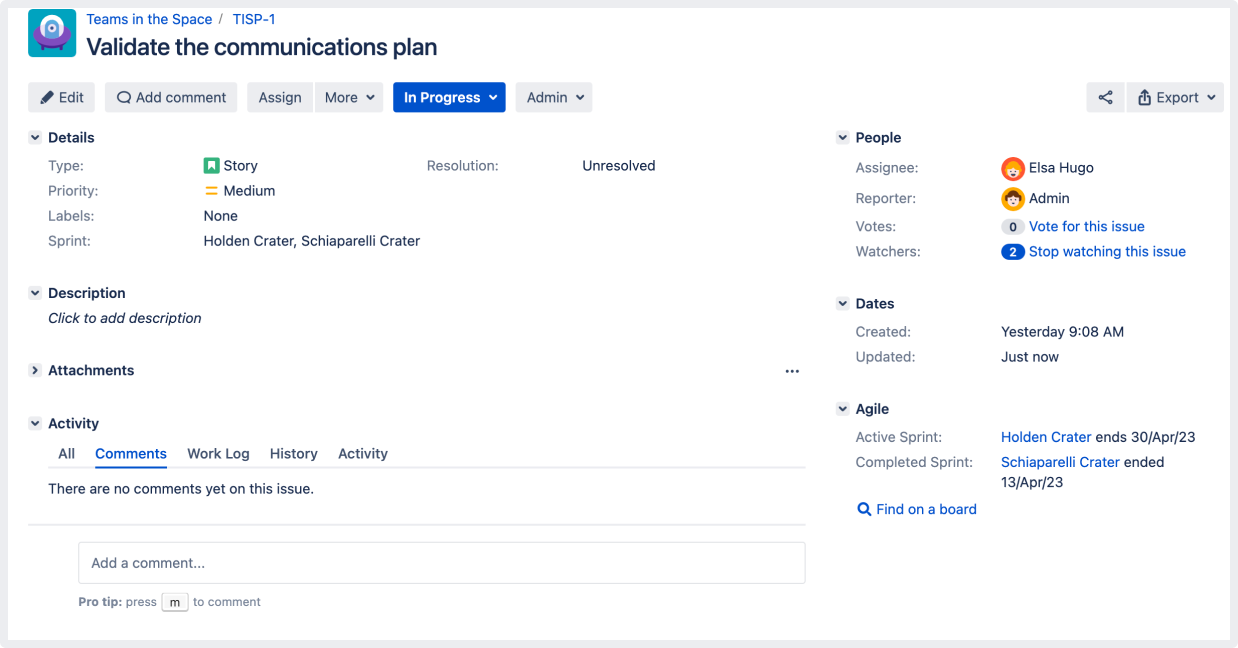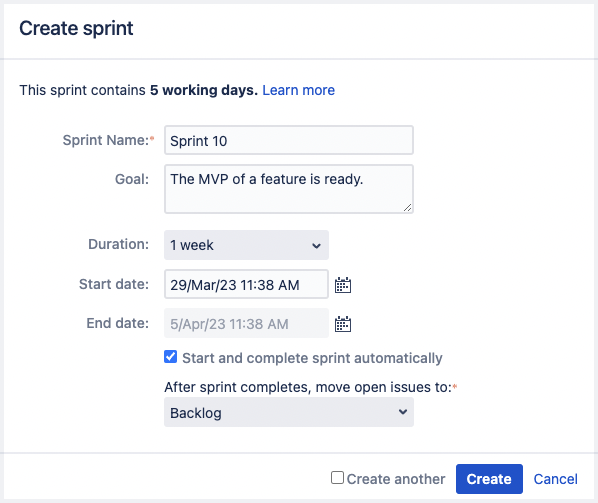Jira Software 9.8.x upgrade notes
Here are some important notes on upgrading to Jira Software 9.8.x.
Upgrading from 8.x to 9.x triggers full Jira reindex that causes some downtime during the process. If you’re on 8.x now, make sure you’ve estimated the downtime and set the best time for the upgrade.
Learn more about how to handle full reindex and estimate downtime
Known issue: this Jira version isn't compatible with Jira Cloud Migration Assistant (JCMA)
We've detected compatibility issues between Jira 9.8 and 1.9.x and earlier versions of JCMA. This causes the failure of some migration pre-flight checks, preventing any Server to Cloud migrations.
If you plan to start, test, or run the migration, we suggest not updating to Jira 9.8 and staying on earlier Jira versions (9.7.x) until we release a compatible version of JCMA.
As we're working on the resolution, we recommend using JCMA 1.9.0 for Server to Cloud migrations.
Upgrade notes
Introducing sticky comment footer
This feature is enabled by default with the feature flag com.atlassian.jira.commentStickyFooter. You can disable it by turning off the feature flag.
Adding comments to issues becomes quick and easy as we’re introducing a sticky comment footer. You can now start a conversation from any place in the issue view with a single click or press or a button (just press m to comment).
Here’s a closer look at the updates:
- Stay on top of a conversation without any context switching. Type a response as you read or browse through other comments.
- Remain focused as you type. When you mention “@” someone, the list of suggested users is displayed exactly where your cursor is.
Read more about commenting in Jira
Auto-managed sprints
You no longer need to go over multiple boards to start a new sprint or close a completed sprint. Now, you can schedule a sprint to start and complete automatically. You can set up the configuration for sprint auto-management when:
- creating a future sprint
- creating a new sprint that you want to start now
- editing an existing sprint
Here’s a quick setting for an auto-managed sprint:
- Select the date and time when the sprint must start and be completed automatically.
- Enable auto-start and auto-complete for the sprint.
- Select the place where you want to move issues that will remain open after the sprint auto-completes. You can select from the backlog, a new sprint that Jira will create, or existing future sprints.
Learn more about sprint auto-management
New mail queue metrics for in-product diagnostics
We’re introducing new mail queue metrics for more effective in-product diagnostics (IPD) available through JMX. The new metrics will allow you to get a more detailed picture of mail queue contents and to collect more data for better performance monitoring. In the following table, you’ll find the new metrics and their descriptions.
| MBean ObjectName | Metric description |
|---|---|
com.atlassian.jira:type=metrics,category00=mail,category01=queue,category02=numErrors,name=statistics | Aggregated statistics of the number of items in a mail queue |
com.atlassian.jira:type=metrics,category00=mail,category01=queue,category02=numItems,name=statistics | Aggregated statistics of the number of items in an error mail queue |
com.atlassian.jira:type=metrics, | The latest measure of the number of items added to a mail queue per minute |
com.atlassian.jira:type=metrics, | The latest measure of the number of items added to an error mail queue per minute |
| Aggregated statistics of the number of items added to a mail queue per minute |
com.atlassian.jira:type=metrics, | Aggregated statistics of the number of items added to an error mail queue per minute |
com.atlassian.jira:type=metrics, | The latest measure of the number of items processed by a mail queue per minute |
com.atlassian.jira:type=metrics, | Aggregated statistics of the number of items processed by a mail queue per minute |
com.atlassian.jira:type=metrics, | The latest measure of the number of emails sent by the SMTP server per minute |
com.atlassian.jira:type=metrics, | Aggregated statistics of the number of emails sent by the SMTP server per minute |
com.atlassian.jira:type=metrics, | he latest indicator of the state of a mail queue job
|
Security vulnerability fixes
JMX blocklist deserialization filter
We’ve discovered and provided a robust fix for a potential security vulnerability that may be caused by an RCE (remote code execution) JMX attack. During this attack, a remote user with valid credentials for JMX monitoring can execute arbitrary code on Jira Data Center via Java Deserialization, even if this user’s account is readOnly (montiorRole).
To prevent fabricated data from getting into the system through requests, we're using a blocklist deserialization filter based on ObjectInputFilter from JVM.
If you use a custom JDK and miss appropriate classes in your classpath based on the Java version, your Jira node won’t be started. atlassian.jira.log will contain the following error: BlocklistDeserializationFilter has not been set up. It means that your Java environment has some security issues.
To eliminate the error and boost the security of your Jira instance, make sure your JDK contains the following classes:
- For JDK 8: the class
sun.misc.ObjectInputFiltermust be enabled in the classpath. - For JDK 11 and later: the class
java.io.ObjectInputFiltermust be enabled in the classpath.
End of support announcements
This release does not include any end of support announcements. For the list of supported platforms, see Supported platforms.
App developers
See Preparing for Jira 9.8 for any important changes regarding apps.
Upgrade procedure
Upgrading from a Jira version 9.x.x?
- See Upgrading Jira applications for complete upgrade procedures, including all available upgrade methods and pre-upgrade steps.
- For a more tailored upgrade, go to Jira administration > Applications > Plan your upgrade. We’ll recommend a version to upgrade to, run pre-upgrade checks, and provide you with a custom upgrade guide with step-by-step instructions.


